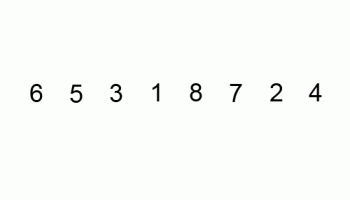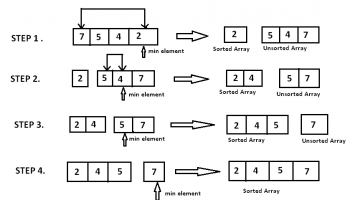// C++ implementation of Kruskal's Algorithm to find the Minimum Spanning tree for a weighted, connected and undirected graph.
#include <iostream>
#include <climits>
#define n 6
int parent[n]; // Parent array to hold the parent nodes of each node in the graph
using namespace std;
void printMST(int a[n], int b[n], int weight[n]) // Printing the MST
{
int Minweight = 0; // Weight of Minimum spanning tree
for (int i = 0; i < n - 1; i++)
{
cout << "Edge: " << a[i] << "-" << b[i] << " "
<< "cost: " << weight[i] << endl;
Minweight += weight[i];
}
cout << "Minimum Weight is " << Minweight << endl; // Printing the weight of MINIMUM SPANNING TREE
}
int findParent(int node) // Function to determine the parent node
{
while(parent[node] >= 0)
node = parent[node];
return node;
}
/* "findParentPathCompression" is an alternative for "findParent" which is more efficient.
* We use a technique called "path compression" here.
* With path compression, we destroy the structure of the tree, and only focus on which group a node is in.
*/
int findParentPathCompression(int node)
{
if(node == parent[node]) return node;
return parent[node] = findParentPathCompression(parent[node]);
}
void kruskal(int cost[n][n]) // Function performing Kruskal's algorithm
{
fill_n(parent, n, -1);
int u, v, k = 0, count = 0;
int firstNode, secondNode;
int a[n]; // Array containing the first nodes of all the edges present in MST
int b[n]; // Array containing the second nodes of all the edges present in MST
int weight[n]; // Array containing the weights of the edges present in MST
int minimum;
for (int i = 0; i < n; i++)
for (int j = 0; j < n; j++)
if (cost[i][j] == 0) // If i and j nodes are not adjacent
cost[i][j] = INT_MAX; // Then, initialize their weight as INFINITE
while(count < n-1)
{
minimum = INT_MAX; // Initializing minimum as INFINITE
for (int i = 0; i < n; i++)
{
for (int j = 0; j < n; j++)
{
if (cost[i][j] < minimum)
{
minimum = cost[i][j]; // find the minimum cost edge
firstNode = i; // First node of determined edge
secondNode = j; // Second node of determined edge
}
}
}
u = findParent(firstNode);
v = findParent(secondNode);
if (u != v) // If parents of both the nodes are different, no circuit is being formed
{
parent[v] = u;
a[k] = firstNode; // Store first node in array
b[k] = secondNode; // Store second node in array
weight[k] = cost[firstNode][secondNode]; // Store the determined edge's weight in array
count++;
k++;
}
cost[firstNode][secondNode] = cost[secondNode][firstNode] = INT_MAX; // Edges getting included in MST will be given the weight of INFINITE
}
printMST(a, b, weight); // Printing the MST
}
// Driver program to test above function
int main()
{
/* Let the given graph is :
(1)____1___(2)
/ /
3 4 4 6
/ /
/ /
(0)___5___(5)____5___(3)
| /
| /
| /
2 /
6 | 8
| /
| /
| /
| /
(4)
*/
int cost[n][n] = {
{ 0, 3, 0, 0, 6, 5 },
{ 3, 0, 1, 0, 0, 4 },
{ 0, 1, 0, 6, 0, 4 },
{ 0, 0, 6, 0, 8, 5 },
{ 6, 0, 0, 8, 0, 2 },
{ 5, 4, 4, 5, 2, 0 }
};
kruskal(cost);
return 0;
}
/*
Output :
Edge: 0-1 cost: 3
Edge: 1-2 cost: 1
Edge: 1-5 cost: 4
Edge: 5-4 cost: 2
Edge: 5-3 cost: 5
Minimum Weight is 15
*/



Để lại một bình luận